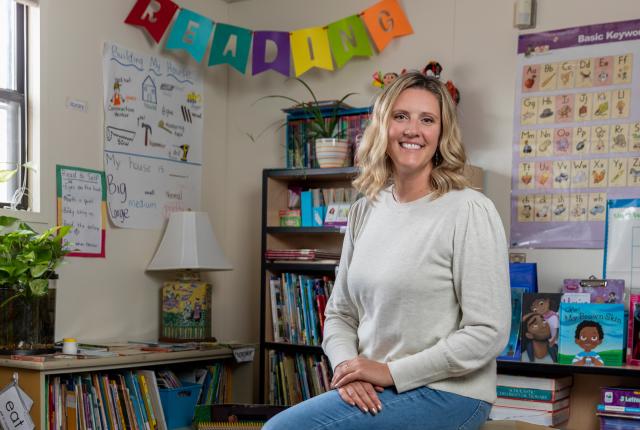DURING RAMADAN LAST YEAR, Liz Bradford and her daughter were bringing food to the home of a recently arrived Rwandan student, to break the holy fast. As a teacher with the Albuquerque Public Schools Refugee and Newcomer Supports Program, Bradford regularly visits students to meet their parents, bring them clothes and food, and check on their well-being.
But this time, something was wrong. Rescue vehicles crowded the street as Bradford’s young student pointed to his neighbor’s apartment. “Mama die,” he said.
The mother of six, a Rwandan refugee who lived downstairs, had suffered a fatal heart attack. The children—most of them Bradford’s students—sat numbly on the couch. “I hugged the little ones,” she recalls. “I just held them. The older ones just seemed as though they had been through so much trauma—loss, death, war, and starvation. What’s another?”
Bradford quickly called a caseworker and found someone who spoke the children’s native language, Kinyarwanda. “Then something amazing happened,” she says. “Someone handed me $500, and other people were giving me $5 in quarters.” Within two weeks, they had raised more than enough to cover the funeral cost. “That showed me how powerful the community
can be.”
An Albuquerque native, Bradford studied education at the University of New Mexico before teaching in Japan and Abu Dhabi. But it was a trip to India, where she witnessed extreme poverty, that clarified her life choices. “There were people dying in the street,” she says. “It made me realize there’s so much need. My cushy life in America did not prepare me for the suffering that is happening all over the world.”
“My cushy life in America did not prepare me for the suffering that is happening all over the world.”
Bradford returned to New Mexico in 2018 and took a job as one of two teachers in the refugee/newcomer program at La Mesa Elementary. A designated immigrant-friendly city, Albuquerque is home to many families being settled directly from Syria, Sudan, Rwanda, Tanzania, Burundi, and the Democratic Republic of the Congo. “Many of these children have endured significant trauma in their short lives, so she has to adapt gentle teaching techniques and work on earning trust from the students and their families,” says Rachel Eagle, Bradford’s stepsister and a prosecutor with the Superintendent of Insurance.
Bradford’s classroom is filled with pictures of the smiling kids and their accomplishments, which include mastering lessons in social customs and displaying kindness to one another. A typical day finds Bradford teaching math and English but also washing clothes for students or helping them brush their teeth or comb their hair. There’s also hugging—lots of it. “She is a very nice person,” says Areej Aldyab, 12, a former student who was born in Syria. “She treats the students like her kids.”
“Liz is one of the hardest workers I’ve ever known,” says Antonio Baca, the Albuquerque native who founded the program, which now serves about 1,000 students across the public school system. “She’s incredibly committed to this work and incredibly thoughtful about this work.”
Bradford is studying for her doctorate in education. Until Covid hit, she was also teaching English and life-skills classes at night for parents, to help them become self-sufficient. Bradford says she’s constantly looking to identify immigrant or refugee leaders to mentor her students.
“I don’t want to be just a white voice in their community,” she says. “I want to make sure they have space for their own voices. To empower themselves.”
TRUE HEROES
Read more about the 10 individuals who went above and beyond to support our communities.


